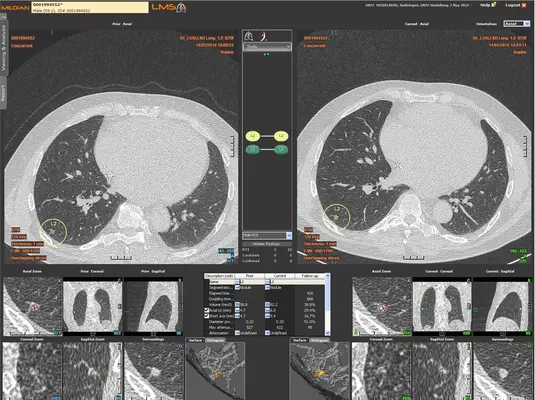Lung tumor screening and intervention trial
Overview

Contact: Dr. med. Jan Tremper; Prof. Dr. med. Stefan Delorme
[autotranslated from German content]
The LUSI study is a large-scale study that has been running at the DKFZ since fall 2007 with the aim of developing methods for the early diagnosis of lung cancer and thus improving the chances of curing this tumor disease. The abbreviation LUSI stands for "Lung tumor screening and intervention trial".
Lung cancer is the leading cause of cancer death, as the diagnosis is usually only made at an advanced stage, meaning that 85 to 90% of patients die in the first 5 years after diagnosis. However, if the disease is detected early, up to 70% of those affected can survive for at least five years.
Under the leadership of the DKFZ's "Epidemiology of Cancer" division, around 290,000 people from the Rhine-Neckar region were contacted between 2007 and 2010 and asked about their smoking habits. From the response, 4,000 people between the ages of 50 and 69 were recruited as participants for the LUSI study. Half of the participants - selected at random - underwent low-dose multislice computed tomography (low-dose MSCT). These CT examinations were carried out at annual intervals over 5 years. The low-dose CT provides meaningful images of the lungs despite the low radiation dose. A questionnaire is sent to the participants annually for a further 5 years. The control group does not receive a CT examination, but is only consulted annually by questionnaire for 10 years.
The CT images are performed and evaluated in the Radiology division of the DKFZ, where more than 12,000 examinations have been carried out over the course of the study, including early check-ups. The CT images are analyzed both by experienced radiologists and with the help of special software that facilitates the detection of suspicious lung changes (so-called round foci) and is used for the documentation and monitoring of lung changes over the study period (see screenshot).
Initial figures from the LUSI study, which is jointly funded by the German Research Foundation (DFG) and the Dietmar Hopp Foundation, show that 80 percent of cancer cases are detected at an early clinical stage, whereas in the control group, the first symptoms only appear at a later tumor stage. However, it is not yet possible to draw any conclusions about a reduction in mortality.
The LUSI study is part of an international collaboration with partner studies in the Netherlands and Belgium (NELSON), Denmark (DLCST) and Italy (ITALUNG), with which the data will ultimately be pooled and analyzed.
Further information on the LUSI study can also be found on the website of the Department of Cancer Epidemiology:
http://www.dkfz.de/de/epidemiologie-krebserkrankungen/arbeitsgr/epipraev/ep_p03_lungscr_a.html
Selected publications:
N. Becker, E. Motsch, M.-L. Gross, M.-L., A. Eigentopf, C.P. Heussel, H. Dienemann, P.A. Schnabel, M. Eichinger, D.-E. Optazaite, M. Puderbach, M. Wielpütz, H.-U. Kauczor, J. Tremper, S. Delorme: Randomised study on early detection of lung cancer with MSCT in Germany: results of the first 3 years of follow-up after randomization. J Thorac Oncol 2015, DOI: 10.1097/JTO.0000000000000530
G. Sommer, J. Tremper, M. Koenigkam-Santos, S. Delorme, N. Becker, J. Biederer, H.-U. Kauczor, C.P. Heussel, H.-P. Schlemmer, M. Puderbach: Lung nodule detection in a high-risk population: Comparison of magnetic resonance imaging and low-dose computed tomography. Eur J Radiol 2013, DOI:10.1016/j.ejrad.2013.11.012.
N. Becker, E. Motsch, M.-L. Gross, A. Eigentopf, C. P. Heussel, H. Dienemann, P. A. Schnabel, L. Pilz, M. Eichinger, D.-E. Optazaite, M. Puderbach, J. Tremper and S. Delorme: Randomized study on early detection of lung cancer with MSCT in Germany: study design and results of the first screening round. J Cancer Res Clin Oncol 2012, DOI: 10.1007/s00432-012-1228-9